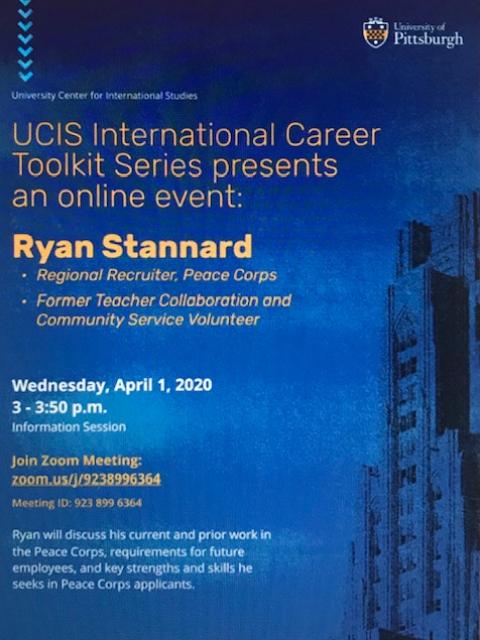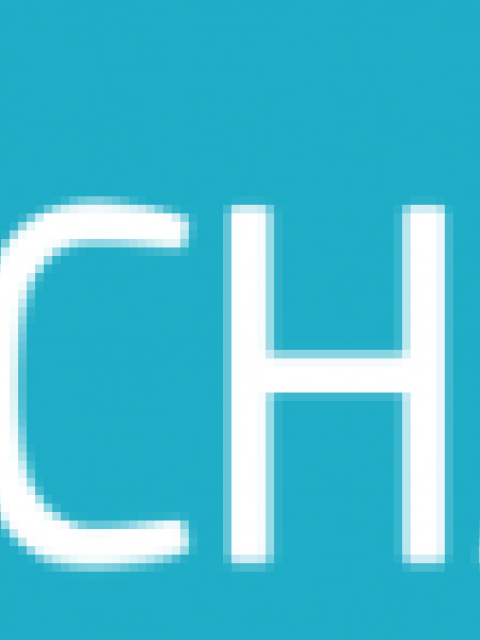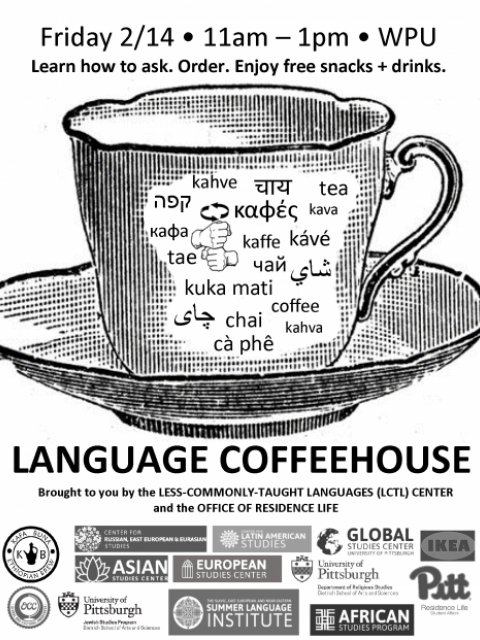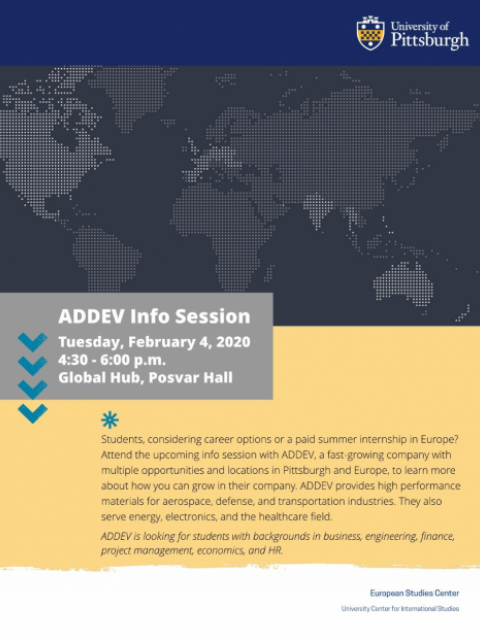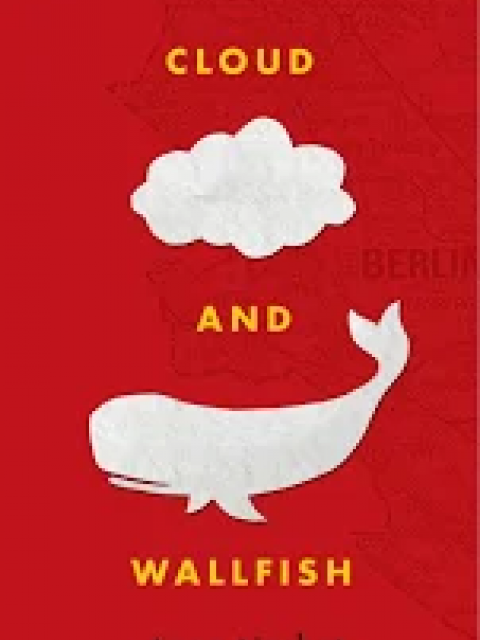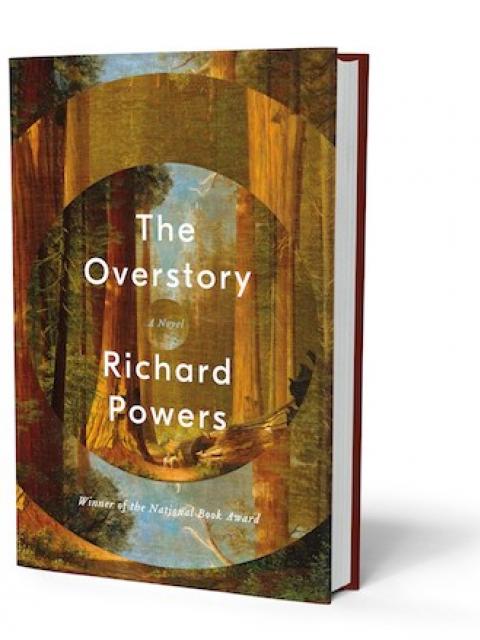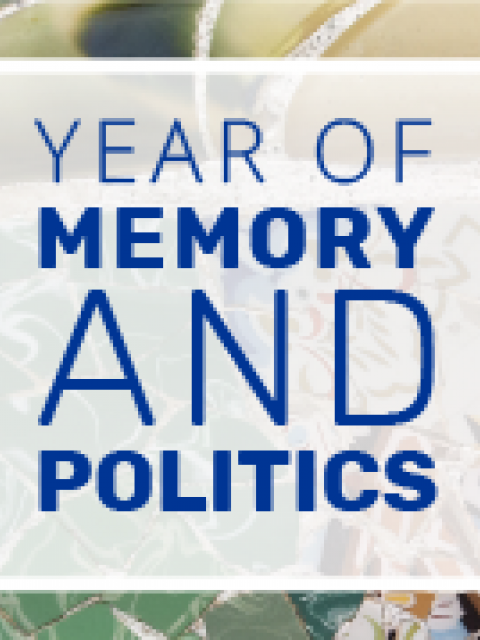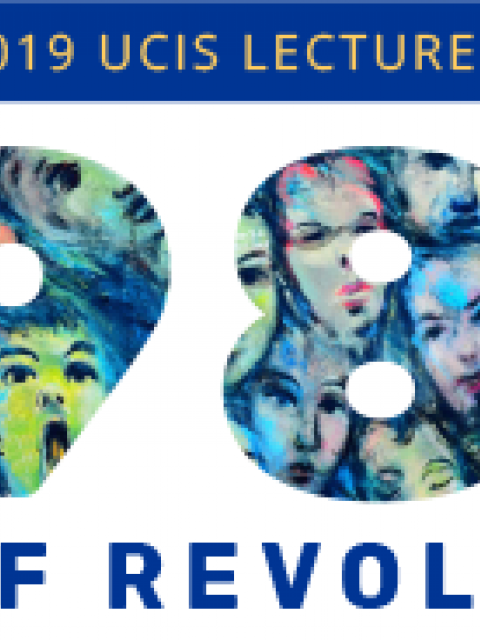Wednesday, April 1st, 2020
UCIS International Career Toolkit Series Presents: Peace Corps Info Session
Location: Online Web Chat - Zoom Application
UCIS International Career Toolkit Series presents an online event:
Ryan Stannard - Regional Recruiter, Peace Corps
Former Teacher Collaboration and Community Service Volunteer
Join in via Zoom:
Wednesday, April 1st, 2020
3:00-3:50pm, Information Session
Join Zoom Meeting:
https://zoom.us/j/9238996364
Meeting ID: 923 899 6364
We are opening up the UCIS Professional Development Class to offer additional students to take part online and learn from Ryan. Ryan will discuss his current and prior work in the Peace Corps, requirements for future employees, and key strengths and skills he seeks in Peace Corps applicants. He'll also answer questions.
Please sign up online at:
https://signup.com/go/cTtOnmN
Questions?
Angela Illig
ami17@pitt.edu
Postponed: Modern Bestiary
Presenter: Audrée Wilhelmy
Location: David Lawrence 231
Part of FRIT's Week of Francophonie. Come create a modern bestiary with Audrée Wilhelmy. This event will be in French.
Tuesday, March 31st, 2020
Postponed: La Pirogue Fim Screening
Location: 501 Cathedral of Learning
Announced by:
on behalf of
Part of FRIT's Week of Francophonie. A screening of the Franco-Senegalese drama film. The film is in French w/ English subtitles.
Postponed: Body of the Beasts
The Territories of Womanhood
Presenter: Audree Wilhelmy
Location: Humanities Center, 602 Cathedral of Learning
Announced by:
on behalf of
Part of FRIT's Week of Francophonie.
Quebecois Author Ms. Wilhelmy discusses The Body of the Beasts, her book on animality and humanness. The event will be in English.
Please join us!
There will also a public book event on Wednesday, April 1 at The White Whale Bookstore in Bloomfield. 7 pm.
Hosted by the Dept. of French and Italian, with support from the Year of Creativity, the Honors College, and the Humanities Center.
Questions? Contact Prof. Kaliane Ung
Online Sessions: ARTSC 1000 - UCIS PROFESSIONAL DEVELOPMENT
Preparing Juniors and Seniors for Employment Beyond Undergraduate Careers
Location: 4130 W. Posvar Hall
Designed for juniors, seniors, and graduate students to establish a career direction
and formulate a strategy for securing a full-time position in today's competitive
international and global workplace. Students focus on developing specific
competencies that include career selection, jobsearch activities, resume and
cover letter development, professionalnetworking techniques, behavioral
interviewing skills, and workplace ethicsin preparation for government, business,
and nonprofit sector careers. ALL ARE WELCOME TO ATTEND WORKSHOPS.
Learning Goals
This initiative emphasizes developing readiness to transition to the
workplace. The focus is on the development of self-awareness, interviewing
skills, the acquisition of job-hunting knowledge as well as the formulation
of an action plan to achieve the student's job and career goals.
Learning Outcomes
1. To clarify personal interests, values, skills
and career options.
2. To research/explore various fields for
international and global careers.
3. To create a career search strategy that
can/will be used upon course completion.
4. To present self effectively in an interview or
conversation with potential employers.
Postponed: Scène Ouverte
Location: O'Hara Ballroom
Announced by:
on behalf of
Part of FRIT's Week of Francophonie. Come see the students from the French Theatre Workshop rehearse L’Ecole des femmes.
This event will be in French.
Monday, March 30th, 2020
Postponed: Out of Time
The Politics of Fantasy in French Cinematic Romance of the 2010s
Presenter: Mary Harrod (Warwick, UK)
Location: 501 Cathedral of Learning
Announced by:
on behalf of
Part of FRIT's Week of Francophonie. A talk on French Rom-Coms by Dr. Mary Harrod.
Canceled: Brexit, the Far Left, and Populist Antisemitism in Britain
Presenter: David Hirsch, Goldsmiths
This event has been canceled
Friday, March 27th, 2020 to Sunday, May 31st, 2020
Transforming Cities: Smart Cities and Technology
Due to economic development and globalization, cities continue to grow with predictions that 70 of the
world’s population will live in urban areas by the year 2050. This course, then, will view cities as hubs
where patterns, connections, discussions, and the processes shape such issues as social justice, economic
development, technology, migration, the environment among others. By examining cities as a lens, this
sequence of weekend courses encourages students to examine cities as a system for discussing social
processes being built and rebuilt. With an interdisciplinary focus, the course invites experts from the
University of Pittsburgh, Carnegie Mellon, and relevant fields more broadly.
This iteration of the course will explore such topics as: the influence of multinational corporations on
cities; the rise of privacy issues in relation to adoption of technology within cities and homes; the
replacement of human labor and access to employment; the role of technology on urban planning,
among others.
One-credit for PITT students / 3 units
Friday, March 27th, 2020 to Sunday, March 29th, 2020
Online: Smart Cities and Technology Mini-Course
Presenter: Veronica Dristas & Korryn Mozisek
Cost: Free and Open to the Public
Due to economic development and globalization, cities continue to grow with predictions that 70 of the world’s population will live in urban areas by the year 2050. This course, then, will view cities as hubs where patterns, connections, discussions, and the processes shape such issues as social justice, economic development, technology, migration, the environment among others. By examining cities as a lens, this sequence of weekend courses encourages students to examine cities as a system for discussing social processes being built and rebuilt. With an interdisciplinary focus, the course invites experts from the University of Pittsburgh, Carnegie Mellon, and relevant fields more broadly.
Thursday, March 26th, 2020
Online Session: China's New Red Guards
Presenter: Jude Blanchette
Location: Zoom (Register online)
Ever since Deng Xiaoping effectively de-radicalized China in the 1980s, debates have swirled around which path China would follow. Would it democratize? Would it embrace capitalism? Would the Communist Party's rule be able to withstand globalization and the internet? One thing few seriously considered: Mao Zedong would make a political comeback. This live interview with Jude Blanchette will discuss the return of the populist enthusiasm for the Great Helmsman's policies, and what it means for the present and future of Chinese communism.
This event is part of the Socialism: Past, Present, and Future Pop-Up Course.
Register to attend here: https://pitt.zoom.us/meeting/register/upQlf-yqpjgqOn6gS4WXNDTFXM_H0kVbOg
Wednesday, March 25th, 2020
Online Sessions: ARTSC 1000 - UCIS PROFESSIONAL DEVELOPMENT
Preparing Juniors and Seniors for Employment Beyond Undergraduate Careers
Location: 4130 W. Posvar Hall
Designed for juniors, seniors, and graduate students to establish a career direction
and formulate a strategy for securing a full-time position in today's competitive
international and global workplace. Students focus on developing specific
competencies that include career selection, jobsearch activities, resume and
cover letter development, professionalnetworking techniques, behavioral
interviewing skills, and workplace ethicsin preparation for government, business,
and nonprofit sector careers. ALL ARE WELCOME TO ATTEND WORKSHOPS.
Learning Goals
This initiative emphasizes developing readiness to transition to the
workplace. The focus is on the development of self-awareness, interviewing
skills, the acquisition of job-hunting knowledge as well as the formulation
of an action plan to achieve the student's job and career goals.
Learning Outcomes
1. To clarify personal interests, values, skills
and career options.
2. To research/explore various fields for
international and global careers.
3. To create a career search strategy that
can/will be used upon course completion.
4. To present self effectively in an interview or
conversation with potential employers.
Tuesday, March 24th, 2020
Canceled: John Hume in America - In the Name of Peace Screening and Talk
Presenter: Maurice Fitzpatrick
Location: Giant Eagle Auditorium, Carnegie Mellon University
IN LIGHT OF DECISIONS BY THE UNIVERSITY OF PITTSBURGH AND CARNEGIE MELLON UNIVERSITY IN RESPONSE TO THE COVID-19 OUTBREAK, THIS EVENT HAS BEEN POSTPONED INDEFINITELY.
John Hume’s political vision and innate sense of diplomacy persuaded key players in U.S. Politics to merge their concerns with his own. Ted Kennedy, Tip O’Neill, Daniel Patrick Moynihan and Hugh Carey – together known as the ‘Four Horsemen’ - were won over to his cause, lending the campaign for equality in Northern Ireland worldwide credibility and putting considerable pressure on the British and Irish governments to strive for peace.
John Hume in America illustrates how John Hume engaged every American President from Jimmy Carter to Bill Clinton. Maurice Fitzpatrick’s film explores Hume’s philosophy of non-violence during the Civil Rights Movement through to his indispensable work with friends in the U.S. to create a new political framework in Northern Ireland.
Maurice Fitzpatrick was educated at Trinity College Dublin. He is a lecturer at Villa Nova University, a film-maker and author. He has worked with John Hume in the past on a book and BBC/RTE film, The Boys of St. Coumb’s, published and broadcast in 2010. In 2013, he wrote and directed a documentary film for the BBC on Brian Friel’s Translations. He also writes journalism, primarily on Irish affairs.
Online: Conversations on Europe: Borders and Contested Memory in Northern Ireland
Time: 12:00 pm to 1:30 pm
Location: 4217 Posvar Hall
This event was originally scheduled for March 17th, but has been rescheduled to March 24th.
As part of the ESC’s 2019-2020 Year of Memory and Politics, this month we explore borders and contested memory in Northern Ireland. Our panel of experts will explore the conflict over territory and identity in Northern Ireland and how that has played out at the border and in other spaces. We will discuss what has changed since the Good Friday/Belfast Agreement and what may happen as a result of Brexit and the recent elections in the Republic of Ireland. Audience participation is encouraged.
To participate remotely, [information to be provided].
Panelists:
- Jonathan Blake, RAND
- Katy Hayward, Queen's University Belfast
- Jennifer Keating, Carnegie Mellon University
- Connal Parr, Northumbria University
Moderator:
Jae-Jae Spoon, University of Pittsburgh
Tuesday, March 24th, 2020 to Wednesday, March 25th, 2020
Canceled: The Role of Universities in Sustainable, Just & Inclusive Cities
Presenter: International Place-Based University Network
Cost: Free and open to the public
DUE TO CONCERNS SURROUNDING COVID-19, NEWCASTLE UNIVERSITY AND THE UNIVERSITY OF PITTSBURGH HAVE DECIDED TO POSTPONE THIS EVENT. AN ANNOUNCEMENT OF THE NEW DATES WILL BE MADE WHEN AVAILABLE.
An Initiative of the International Place-Based University Network
International Place-Based University Network: Academically Based, Globally Minded Community Engagement
Post-industrial cities are crucibles of reinvention and innovation. Those that have successfully navigated the sunsetting of industrial production have creatively reoriented to intellectual technology, advanced manufacturing, business services, and life science innovations. And yet, the challenges that followed industrial decline—loss of population, unemployment, and destructive urban redevelopment strategies—continue to reverberate.
As the founding members of the International Place-Based University Network, Newcastle University and the University of Pittsburgh are hosting this conference. The goal is to share best practices for community and civic engagement as well as to explore potential international collaborations for academically based community engagement.
Tuesday, March 24, 2020
University Club | Ballroom A, First Floor | University of Pittsburgh
Wednesday, March 25, 2020
Community Engagement Center of Homewood
For the agenda or to register, go to
pi.tt/InPlace2020
Monday, March 23rd, 2020
Canceled: Brexit: What’s Happened, and What Happens Next?
Presenter: Anand Menon, King's College London
DUE TO CONCERNS RELATED TO COVID-19, THIS EVENT HAS BEEN CANCELLED. WE APOLOGIZE FOR ANY INCONVENIENCE THIS CAUSES.
Professor Anand Menon is director of The UK in a Changing Europe an award winning academic think tank on Brexit. He is also professor of European Politics and Foreign Affairs at Kings College London.
He has held positions at Sciences Po, Columbia University and NYU. He has written on many aspects of contemporary Europe and is co-editor of the Oxford Handbook of the European Union. He is co-author of ‘Brexit and British Politics’ and author of ‘Europe: The State of the Union’.
He has written for the Financial Times, the Guardian, the Daily Telegraph, the Times, the Independent, New Statesman and Spectator. He is a frequent commentator on local, national and international media and has made several radio documentaries on contemporary politics.
He is a member of the Council of the European Council on Foreign Relations and an associate fellow of Chatham House.
Saturday, March 21st, 2020
Canceled: The Scottish and the Jacobites
Presenter: Paul Thompson, President of the St. Andrew's Society of Pittsburgh
Location: Frick Fine Arts Auditorium
Announced by:
on behalf of
Refreshments will be served from 3:30 PM to 4:30 PM.
For more information contact scottishroom@gmail.com
Friday, March 20th, 2020
ONLINE: 2020 Global Studies Research Toolkit for Students
Presenter: Dr. Michael Goodhart
Location: 3415 Posvar Hall
Cost: Free and Open to Students
Are you interested in turning your academic interests into research projects? Dr. Michael Goodhart, Professor of Political Science and Director of Global Studies Center, will lead this session with interested students on the how-to’s of research in the social sciences and humanities, formulate and apply concepts to their own research, and engage with junior faculty about their research experiences.
Registration:https://docs.google.com/forms/d/e/1FAIpQLSfFh10mYs7DyyeHqDtzcvDSqX7hHRfh...
Thursday, March 19th, 2020
Canceled: UCIS Pre-Registration Tabling
Location: Pitt Global Hub
As students consider what they will register for in the fall, advisors and students from the University Center for International Studies will be available throughout the week to answer questions about international studies certificates, study abroad, and resources to support research and career development.
Canceled: EUSA Roundtable: Discussion on the Issues Currently Impacting the EU
DUE TO A NUMBER OF OUR PANELISTS BEING UNABLE TO TRAVEL, THIS EVENT HAS BEEN CANCELLED. WE APOLOGIZE FOR ANY INCONVENIENCE THIS MAY CAUSE.
Spotlight: Researching the EU at Pitt
Featuring – Dan Pennell, University Library Services on the Barbara Sloan Collection and the Archive of European Integration
European Union Studies Association Roundtable on the State of the EU Today: “Bigger Fish to Fry? The EU after Brexit”
The ESC is pleased to welcome members of the EUSA Executive Committee for a roundtable discussion of migration and citizenship, democratic deficit and backsliding, security concerns, Euroskepticism and public opinion. Moderated by the Chair of EUSA, Matthias Matthijs, Johns Hopkins University.
Panelists:
Christina Schneider, University of California-San Diego
Stephanie Hofmann, Graduate Institute of International and Development Studies (Geneva)
Sara Goodman, University of California-Irvine
Catherine De Vries, Bocconi University
Milada Vachudova, University of North Carolina-Chapel Hill
Book Launch: The European Union and Beyond: Multi-Level Governance, Institutions, and Policy-Making (ECPR Press, 2020). Co-edited by Jae-Jae Spoon and Nils Ringe.
Featuring: Jae-Jae Spoon, Co-Editor and Director of the European Studies Center at Pitt
This edited volume resulted from a November 2019 Symposium at Pitt in honor of the ESC’s founding director, Prof. Alberta Sbragia (retired) and features contributions from scholars at Pitt and from other parts of the world. Together, the chapters seek to examine current debates and issues in the study of regional integration, multilevel governance, and European Union studies.
Wednesday, March 18th, 2020
Online Sessions: ARTSC 1000 - UCIS PROFESSIONAL DEVELOPMENT
Preparing Juniors and Seniors for Employment Beyond Undergraduate Careers
Location: 4130 W. Posvar Hall
Designed for juniors, seniors, and graduate students to establish a career direction
and formulate a strategy for securing a full-time position in today's competitive
international and global workplace. Students focus on developing specific
competencies that include career selection, jobsearch activities, resume and
cover letter development, professionalnetworking techniques, behavioral
interviewing skills, and workplace ethicsin preparation for government, business,
and nonprofit sector careers. ALL ARE WELCOME TO ATTEND WORKSHOPS.
Learning Goals
This initiative emphasizes developing readiness to transition to the
workplace. The focus is on the development of self-awareness, interviewing
skills, the acquisition of job-hunting knowledge as well as the formulation
of an action plan to achieve the student's job and career goals.
Learning Outcomes
1. To clarify personal interests, values, skills
and career options.
2. To research/explore various fields for
international and global careers.
3. To create a career search strategy that
can/will be used upon course completion.
4. To present self effectively in an interview or
conversation with potential employers.
Canceled: UCIS Pre-Registration Tabling
Location: Pitt Global Hub
As students consider what they will register for in the fall, advisors and students from the University Center for International Studies will be available throughout the week to answer questions about international studies certificates, study abroad, and resources to support research and career development.
Tuesday, March 17th, 2020
Canceled: UCIS Pre-Registration Tabling
Location: Pitt Global Hub
As students consider what they will register for in the fall, advisors and students from the University Center for International Studies will be available throughout the week to answer questions about international studies certificates, study abroad, and resources to support research and career development.
Monday, March 16th, 2020
Canceled: UCIS Pre-Registration Tabling
Location: Pitt Global Hub
As students consider what they will register for in the fall, advisors and students from the University Center for International Studies will be available throughout the week to answer questions about international studies certificates, study abroad, and resources to support research and career development.
Tuesday, March 10th, 2020
2020 Euro Challenge
Location: 4217 Posvar Hall
The Euro Challenge is a national competition for cash prizes where 9th and 10th grade high school students test their knowledge and understanding of the European economy and the Euro, the currency shared by many of the 28 countries of the European Union. The European Studies Center is proud to host the Western Pennsylvania regional competition for Euro Challenge at the University of Pittsburgh.
Participation can be in-person or remote. The top team(s) from the regional competition will advance to the national competition in New York City, scheduled for April 28, 2020.
To learn more about Euro Challenge and register for the 2020 competition, please visit www.euro-challenge.org.
Friday, March 6th, 2020
UCIS E-Portfolio Session
Location: Pitt Global Hub
Do you have questions about completing your e-portfolio for your UCIS certificate? Advisors and students will be available to introduce you to the template, help you brainstorm what to say, and answer any tech questions you may have.
Thursday, March 5th, 2020
Underground Entrepreneurs in the Soviet Union
Location: 4130 Wesley W. Posvar Hall
Shortages, bottlenecks, and over-centralization in the Soviet economy made the distribution of goods uneven, limited, and, to some extent, non-existent. But it would be a mistake to see the Soviet economy as only a planned, top-down system. Interwoven within it were shadow economies with illegal schemes that the innovative and corrupt exploited. What do these shadow economies say about Soviet everyday life, informal networks, and corruption, and how did their proliferation reflect and shape the realities of Soviet socialism? This live interview with James Heinzen will explore these questions and more through the culture, practices and morays of underground entrepreneurs in the Soviet Union from the 1960s to the 1980s.
This event is part of the Socialism: Past, Present and Future Pop-Up Course.
UCIS E-Portfolio Session
Location: Pitt Global Hub
Do you have questions about completing your e-portfolio for your UCIS certificate? Advisors and students will be available to introduce you to the template, help you brainstorm what to say, and answer any tech questions you may have.
Wednesday, March 4th, 2020
Online Sessions: ARTSC 1000 - UCIS PROFESSIONAL DEVELOPMENT
Preparing Juniors and Seniors for Employment Beyond Undergraduate Careers
Location: 4130 W. Posvar Hall
Designed for juniors, seniors, and graduate students to establish a career direction
and formulate a strategy for securing a full-time position in today's competitive
international and global workplace. Students focus on developing specific
competencies that include career selection, jobsearch activities, resume and
cover letter development, professionalnetworking techniques, behavioral
interviewing skills, and workplace ethicsin preparation for government, business,
and nonprofit sector careers. ALL ARE WELCOME TO ATTEND WORKSHOPS.
Learning Goals
This initiative emphasizes developing readiness to transition to the
workplace. The focus is on the development of self-awareness, interviewing
skills, the acquisition of job-hunting knowledge as well as the formulation
of an action plan to achieve the student's job and career goals.
Learning Outcomes
1. To clarify personal interests, values, skills
and career options.
2. To research/explore various fields for
international and global careers.
3. To create a career search strategy that
can/will be used upon course completion.
4. To present self effectively in an interview or
conversation with potential employers.
Tuesday, March 3rd, 2020
Historical Memory and Politics in Poland: The Story of the Gdańsk Museum of the Second World War
Presenter: Dr. Paweł Machcewicz, DAAD Lecturer
Location: 4217 Posvar Hall
UCIS E-Portfolio Session
Location: Pitt Global Hub
Do you have questions about completing your e-portfolio for your UCIS certificate? Advisors and students will be available to introduce you to the template, help you brainstorm what to say, and answer any tech questions you may have.
Monday, March 2nd, 2020
UCIS E-Portfolio Session
Location: Pitt Global Hub
Do you have questions about completing your e-portfolio for your UCIS certificate? Advisors and students will be available to introduce you to the template, help you brainstorm what to say, and answer any tech questions you may have.
Friday, February 28th, 2020
UCIS Career Toolkit: Aly Yingst '16
Time: 12:00 pm to 1:30 pm
Presenter: Aly Yingst '16
Location: 4217 Posvar Hall
Cost: Free and Open to the Students
Join Aly Yingst, Biological Sciences and BPhil/IAS/Global Studies and current PhD student at the University of Iceland, in a discussion about how to prepare for graduate school and life abroad.
Since graduating, Yingst has completed a Fulbright-funded Master's degree in Iceland, traveled the world working as a lecturer on expedition cruise ships. She is currently pursuing a PhD in Global Studies.
Thursday, February 27th, 2020
The Crisis of Truth
Presenter: Dr. Sophia Rosenfeld, University of Pennsylvania
Location: 4130 Posvar Hall
Pundits everywhere claim that, in the age of Trump and Brexit, political life no longer depends on any shared sense of truth. This talk will consider the validity of this claim, exploring the role of truth in democracies going back to the eighteenth century, but also the changed circumstances of the present in Europe and much of the world.
Free lunch will be available to all attendees.
Postcolonial Socialisms in Africa
Location: 211 David Lawrence Hall
Shortly after independence, Julius Nyerere, the first President of Tanzania, embarked on a socialist experiment: the ujamaa, the villagization initiative of 1967-1975. Ujamaa, or "familyhood" in Swahili, both invoked established socialist themes and departed from the existing global repertoire of development policy by seeking to reorganize the Tanzanian countryside into communal village to achieve national development. This live interview with Priya Lal will discuss how ujamaa was envisioned and unfolded in Tanzania and how that experience spoke to particularities of African socialisms, nation building and development in the 1960s and 1970s.
This event is part of the Socialism: Past, Present, and Future Pop-Up Course.
UCIS Career Toolkit Series: Viveka Mandava '14
Presenter: Viveka Mandava '14
Location: 4217 Posvar Hall
Cost: Free and Open to the Students
Join Viveka Mandava, Religious Studies with honors/Global Studies/Political Science at University of Pittsburgh, for a Q&A session to learn about what they are doing and how they go there following their time at Pitt.
While at Pitt, Mandava was a founding member of Pitt's chapter of United Studients Against Sweatshops (USAS) and a research fellow in the Honors College. Since graduating, Mandava has been a Boren scholar, worked for 270 Strategies, the 2016 Hilary for America Campaign, and 21st Century Fox. Currently, Mandava works in New York City as the Social Impact Manager for General Assembly.
Wednesday, February 26th, 2020
Online Sessions: ARTSC 1000 - UCIS PROFESSIONAL DEVELOPMENT
Preparing Juniors and Seniors for Employment Beyond Undergraduate Careers
Location: 4130 W. Posvar Hall
Designed for juniors, seniors, and graduate students to establish a career direction
and formulate a strategy for securing a full-time position in today's competitive
international and global workplace. Students focus on developing specific
competencies that include career selection, jobsearch activities, resume and
cover letter development, professionalnetworking techniques, behavioral
interviewing skills, and workplace ethicsin preparation for government, business,
and nonprofit sector careers. ALL ARE WELCOME TO ATTEND WORKSHOPS.
Learning Goals
This initiative emphasizes developing readiness to transition to the
workplace. The focus is on the development of self-awareness, interviewing
skills, the acquisition of job-hunting knowledge as well as the formulation
of an action plan to achieve the student's job and career goals.
Learning Outcomes
1. To clarify personal interests, values, skills
and career options.
2. To research/explore various fields for
international and global careers.
3. To create a career search strategy that
can/will be used upon course completion.
4. To present self effectively in an interview or
conversation with potential employers.
UCIS International Career Toolkit Series Presents: Crafting Your Brand, Nonprofit vs Federal Careers
Location: Posvar Hall, Rm 4130
Join Cyndee Pelt, seasoned management and policy leadership professional, as she shares her experience of serving in nonprofits and the U.S. government overseas and in Washington, D.C. Topics will include the benefits of a nonprofit vs a government career, crafting a federal resume, managing USAJOBS.gov, and professionalism tips for each setting.
Wednesday, February 26, 2020
3-4pm
4130 Posvar Hall
Please sign up for the event below:
https://signup.com/go/EdghNxu
Sponsored by: The African Studies Program, Asian Studies Center, Center for Latin American Studies, Center for Russian, East European and Eurasian Studies, European Studies Center, and the Global Studies Center.
Friday, February 21st, 2020 to Saturday, February 22nd, 2020
Undergraduate Model European Union
Presenter: Dr. Cristina Blanco Sio-Lopez
Thursday, February 20th, 2020
Objects and Values of Labor in Socialist Hungary
Presenter: Martha Lampland
Location: 4130 Wesley W. Posvar Hall
Income inequality and what to do about it is a hot button political issue throughout our world. Much this disparity is the result of how the value of labor is calculated. How much is a worker's labor worth? How is it measured? Namely, how is it commodified? This live interview with Martha Lampland will discuss these questions from an unlikely place--socialist Hungary--to shed light on how economists in a society without a labor market nonetheless determined the value of labor and what this says about socialism and capitalism.
This event is part of the Socialism: Past, Present, and Future Pop-Up Course.
Wednesday, February 19th, 2020
Online Sessions: ARTSC 1000 - UCIS PROFESSIONAL DEVELOPMENT
Preparing Juniors and Seniors for Employment Beyond Undergraduate Careers
Location: 4130 W. Posvar Hall
Designed for juniors, seniors, and graduate students to establish a career direction
and formulate a strategy for securing a full-time position in today's competitive
international and global workplace. Students focus on developing specific
competencies that include career selection, jobsearch activities, resume and
cover letter development, professionalnetworking techniques, behavioral
interviewing skills, and workplace ethicsin preparation for government, business,
and nonprofit sector careers. ALL ARE WELCOME TO ATTEND WORKSHOPS.
Learning Goals
This initiative emphasizes developing readiness to transition to the
workplace. The focus is on the development of self-awareness, interviewing
skills, the acquisition of job-hunting knowledge as well as the formulation
of an action plan to achieve the student's job and career goals.
Learning Outcomes
1. To clarify personal interests, values, skills
and career options.
2. To research/explore various fields for
international and global careers.
3. To create a career search strategy that
can/will be used upon course completion.
4. To present self effectively in an interview or
conversation with potential employers.
Tuesday, February 18th, 2020
Conversations on Europe: Monuments and Contested Memory in Europe
Time: 12:00 pm to 1:30 pm
Location: 4217 Posvar Hall (Remote Participation Possible)
Monday, February 17th, 2020
How Cafés Created Modern Jewish Culture
A Talk with Shachar Pinsker
Time: 12:00 pm to 2:00 pm
Presenter: Dr. Shachar Pinsker, University of Michigan
Location: Humanities Center, 602 Cathedral of Learning
Announced by:
on behalf of
Please join us for coffee, pastries, and an immersive discussion of Jewish cafe culture at the turn of the twentieth century. Dr. Shachar Pinsker, professor of Judaic and Middle Eastern studies at the University of Michigan, will talk about the convergence of cafés, their urban milieu, and Jewish creativity. Pinsker’s research uncovers a network of interconnected cafés that were central to the modern Jewish experience in a time of migration and urbanization, from Odessa, Warsaw, Vienna, and Berlin to New York City and Tel Aviv.
Friday, February 14th, 2020
Language Coffeehouse
Time: 11:00 am to 1:00 pm
Location: Assembly Room, William Pitt Union
Take a break from studying to order and enjoy kaffe and kanelbullar in Swedish, chai and chakli in Hindi, or gazoz and kuru pasta in Turkish! Instructors and students from the LCTL Center will teach you how to place your order in Swahili, Quechua, Irish, Greek, Amharic, Vietnamese, or one of the 15 languages we offer. Then you can place your order at the LCTL Coffeehouse and enjoy free drinks and snacks from around the world. This is the international study break you have been waiting for! Stop by the LCTL Coffeehouse in the WPU Assembly Room on Friday 2/14 between 11am and 1pm to try it out.
Thursday, February 13th, 2020
What is a Woman?
Beauvoir’s Understanding of Sex as Situation
Presenter: Dr. Manon Garcia, Harvard University
Location: Humanities Center, 602 Cathedral of Learning
To commemorate the 70th anniversary of the publication of Simone de Beauvoir's ground-breaking The Second Sex, Dr. Manon Garcia (Harvard) will offer a lecture for undergraduates titled 'What is a Woman?: Beauvoir’s Understanding of Sex as Situation.' All students are welcome! Talk in English!
Dr. Garcia (Harvard) recently published the well-received book On ne naît pas soumise, on le devient (“One is not born, but rather becomes, submissive”) (Flammarion, October 2018), which is part of a recent reconsideration of the legacy of Simone de Beauvoir.
Cosponsored by Gender, Sexuality, and Women's Studies, the Associate Dean for Undergraduate Studies, the European Studies Center, the Honors College, and the Humanities Center.
Wednesday, February 12th, 2020
From Abdication to Independence
Beauvoir’s Philosophy of Love as Emancipatory Analysis
Presenter: Dr. Manon Garcia, Harvard University
Location: Humanities Center, 602 Cathedral of Learning
Dr. Manon Garcia (Harvard) will deliver the lecture to commemorate the memory of Professor Philip Watts and the 70th anniversary of the publication of Simone de Beauvoir's "The Second Sex:"
"From Abdication to Independence: Beauvoir's Philosophy of Love as Emancipatory Analysis", Wednesday, February 12, 2020, 5-6:30 pm, 602 CL
Join us for the Watts lecture in French studies. Dr. Manon Garcia (Harvard) will deliver the lecture to commemorate the memory of Prof. Phil Watts and the 70th anniversary of the publication of Simone de Beauvoir's The Second Sex. All are welcome!
Co-sponsored by Gender, Sexuality, and Women's Studies, the European Studies Center, and the Humanities Center.
Structurally Adjusting Socialism
Presenter: Joanna Bockman
Location: Alcoa Room, 209 Barco Law Building
Socialism is often discussed as a singular, proper noun devoid of ideological, regional, political, or economic difference. Several types of socialism were operative in the twentieth century--from Soviet state socialism to Yugoslav worker self-management. What were some of the transnational movements of socialist experimentation and how, in the later decades of the twentieth century, intersect with, offer alternatives, and even shape neoliberalism? The first interview for REEES Series "Socialism: Past, Present, and Future" with Johanna Bockman will examine her work on second and third world perspectives on globalization, neoliberalism, and socialism.
This event is a part of the Socialism: Past, Present, and Future Pop-Up Course.
Online Sessions: ARTSC 1000 - UCIS PROFESSIONAL DEVELOPMENT
Preparing Juniors and Seniors for Employment Beyond Undergraduate Careers
Location: 4130 W. Posvar Hall
Designed for juniors, seniors, and graduate students to establish a career direction
and formulate a strategy for securing a full-time position in today's competitive
international and global workplace. Students focus on developing specific
competencies that include career selection, jobsearch activities, resume and
cover letter development, professionalnetworking techniques, behavioral
interviewing skills, and workplace ethicsin preparation for government, business,
and nonprofit sector careers. ALL ARE WELCOME TO ATTEND WORKSHOPS.
Learning Goals
This initiative emphasizes developing readiness to transition to the
workplace. The focus is on the development of self-awareness, interviewing
skills, the acquisition of job-hunting knowledge as well as the formulation
of an action plan to achieve the student's job and career goals.
Learning Outcomes
1. To clarify personal interests, values, skills
and career options.
2. To research/explore various fields for
international and global careers.
3. To create a career search strategy that
can/will be used upon course completion.
4. To present self effectively in an interview or
conversation with potential employers.
Tuesday, February 11th, 2020
Imagined Commemorations: EU Unremembering of the Great War, 2014
Location: 2431 Posvar Hall
How Judges and Lawyers Behaved During the Holocaust in Europe, and the Aftermath in US Federal Courts
Presenter: Richard Weisberg, Yeshiva University
Location: Alcoa Room, Barco Law Building
Announced by:
on behalf of
Friday, February 7th, 2020
The Politics of Race in the European Middle Ages
Presenter: Geraldine Heng, University of Texas Austin
Location: Humanities Center, 602 Cathedral of Learning
Announced by:
on behalf of
Prof. Heng is the author of The Invention of Race in the European Middle Ages (Cambridge, 2018). This book is a major intervention in Medieval Studies and has sparked conversations across a number of disciplines. We are excited to be able to discuss that project with her. This lecture will be followed by informal responses from a number of members of the Pitt community - some from MRST, some not.
Wednesday, February 5th, 2020
Online Sessions: ARTSC 1000 - UCIS PROFESSIONAL DEVELOPMENT
Preparing Juniors and Seniors for Employment Beyond Undergraduate Careers
Location: 4130 W. Posvar Hall
Designed for juniors, seniors, and graduate students to establish a career direction
and formulate a strategy for securing a full-time position in today's competitive
international and global workplace. Students focus on developing specific
competencies that include career selection, jobsearch activities, resume and
cover letter development, professionalnetworking techniques, behavioral
interviewing skills, and workplace ethicsin preparation for government, business,
and nonprofit sector careers. ALL ARE WELCOME TO ATTEND WORKSHOPS.
Learning Goals
This initiative emphasizes developing readiness to transition to the
workplace. The focus is on the development of self-awareness, interviewing
skills, the acquisition of job-hunting knowledge as well as the formulation
of an action plan to achieve the student's job and career goals.
Learning Outcomes
1. To clarify personal interests, values, skills
and career options.
2. To research/explore various fields for
international and global careers.
3. To create a career search strategy that
can/will be used upon course completion.
4. To present self effectively in an interview or
conversation with potential employers.
Tuesday, February 4th, 2020
ADDEV Materials Internship & Employment Info Session
Presenter: Addev Materials
Location: Global Hub - Posvar Hall
As a fast-growing, privately-owned company, Addev Materials is regularly changing, growing and responding to trends in its sector. Starting as a distributor, they have since become a converter of high-performance materials, strengthening their strategic partnerships, investing in manufacturing capacities, developing converting technologies, and widening the services they offer. Undergraduates from any discipline are welcome to come and learn about opportunities through Addev Materials in the US and abroad. Information will also be presented regarding their summer 2020 internship opportunity (which can be viewed in the Career Center's database).
Please RSVP with Steve Lund at slund@pitt.edu
ADDEV Company Info Session
A fast-growing company with locations in Pittsburgh and Europe
Presenter: ADDEV Associates
Location: Posvar Hall, Global Hub
Students, considering career options or a paid summer internship in Europe? Attend the upcoming info session with ADDEV, a fast-growing company with multiple opportunities and locations in Pittsburgh and throughout Europe, to learn more about how you can grow in their company. ADDEV provides high performance materials for aerospace, defense, and transportation industries. They also serve energy, electronics, and the healthcare field. ADDEV is seeking students with backgrounds in business, engineering, finance, project management, economics, and HR.
ADDEV Info Session
Tuesday, February 4th
4:30-6:00pm
Posvar Hall, Global Hub
A Deadly Conflict
Irregular Migration and the Politics of Saving Lives in the Central Mediterranean
Presenter: Dr. Gemma Marolda
Location: Posvar Hall 3800
Search and Rescue (SAR) missions in the Central Mediterranean continue to be the subject of extensive debate in Italy and in Europe, even as the number of sea arrivals have significantly declined. A multitude of actors engaged in rescuing migrants and refugees at sea has created an increasingly complex situation in the waters south of Sicily all the way to the Libyan coast. Based on previous and on-going research by Dr. Marolda and her Ford Institute working group, this lecture addresses the following questions: 1) What is the migration challenge Europe is facing in the Central Mediterranean? How have state and non-state actors responded to this challenge? 2) How have the EU’s and Italy’s migration policies and practices changed since October 3, 2013, when 368 migrants tragically lost their lives at sea off the coast of Lampedusa? 3) Why have NGOs rescuing migrants at sea been recently forbidden to dock to Italian ports? What has driven the EU and its member states to restrict NGOs’ operations at sea?
Thursday, January 30th, 2020
Exposing Chernobyl
Presenter: Kate Brown, Professor of Science, Technology, and Society, MIT
Location: 4130 Wesley W. Posvar Hall
The hit HBO miniseries Chernobyl thrust the nuclear disaster back into public consciousness. What are its legacies in and around the "Exclusion zone"? This live interview with award-winning historian Kate Brown will discuss her book Chernobyl: A Manual for Survival and the role of international agencies in actively suppressing the magnitude of this human and ecological catastrophe.
This event is part of the REEES Fall Speaker Series, Nuclear Fallout: Science and Society in Eurasia.
UCIS International Career Toolkit Series: ARYSE Info Session
Location: Pitt Global Hub
ARYSE is a local organization that facilitates after school and summer programming for immigrant youth in Pittsburgh. They are currently recruiting for directors and counselors (paid positions) for their summer program, PRYSE Academy.
Through engaging academic curricula, creative expression workshops, team-building activities, field trips, and soccer programming, PRYSE is proven to help participants develop literacy skills, build personal confidence, prepare for the school year, and deepen their sense of belonging.
Come by the Pitt Global Hub to learn more about this incredible organization and how you can apply.
JMEUCE Lecture: Caught Between 1945 and 1989 - Memory, Democracy, and the Future of Europe
Time: 12:30 pm to 2:00 pm
Presenter: Peter Verovsek, University of Sheffield
Location: 4130 Posvar Hall
As part of our Year of Memory and Politics Series, the ESC is pleased to welcome Peter J. Verovšek as a Jean MonnetCenter of Excellence speaker. Thirty years after 1989 - and15 years since the first postcommunist states joined the EU - European memory is still divided by the faultlines of the Cold War. Whereas the West’s historical imaginary is based on the traumas of Nazism associated with 1945, Central Europe’s is dominated by the legacy of communism signified by 1989. These differing understandings of the past have resulted in divergent conceptions of democracy. The future of the EU depends on its ability to create a common historical narrative that incorporates the lessons of the traumas of 1945 and 1989.
Wednesday, January 29th, 2020
Online Sessions: ARTSC 1000 - UCIS PROFESSIONAL DEVELOPMENT
Preparing Juniors and Seniors for Employment Beyond Undergraduate Careers
Location: 4130 W. Posvar Hall
Designed for juniors, seniors, and graduate students to establish a career direction
and formulate a strategy for securing a full-time position in today's competitive
international and global workplace. Students focus on developing specific
competencies that include career selection, jobsearch activities, resume and
cover letter development, professionalnetworking techniques, behavioral
interviewing skills, and workplace ethicsin preparation for government, business,
and nonprofit sector careers. ALL ARE WELCOME TO ATTEND WORKSHOPS.
Learning Goals
This initiative emphasizes developing readiness to transition to the
workplace. The focus is on the development of self-awareness, interviewing
skills, the acquisition of job-hunting knowledge as well as the formulation
of an action plan to achieve the student's job and career goals.
Learning Outcomes
1. To clarify personal interests, values, skills
and career options.
2. To research/explore various fields for
international and global careers.
3. To create a career search strategy that
can/will be used upon course completion.
4. To present self effectively in an interview or
conversation with potential employers.
Thursday, January 23rd, 2020
The Doctor's Wife by Sawako Ariyoshi.
Global Issues Through Literature
Presenter: Elizabeth Oyler, East Asian Languages and Literatures
Location: 4130 Posvar Hall
Wednesday, January 22nd, 2020
Online Sessions: ARTSC 1000 - UCIS PROFESSIONAL DEVELOPMENT
Preparing Juniors and Seniors for Employment Beyond Undergraduate Careers
Location: 4130 W. Posvar Hall
Designed for juniors, seniors, and graduate students to establish a career direction
and formulate a strategy for securing a full-time position in today's competitive
international and global workplace. Students focus on developing specific
competencies that include career selection, jobsearch activities, resume and
cover letter development, professionalnetworking techniques, behavioral
interviewing skills, and workplace ethicsin preparation for government, business,
and nonprofit sector careers. ALL ARE WELCOME TO ATTEND WORKSHOPS.
Learning Goals
This initiative emphasizes developing readiness to transition to the
workplace. The focus is on the development of self-awareness, interviewing
skills, the acquisition of job-hunting knowledge as well as the formulation
of an action plan to achieve the student's job and career goals.
Learning Outcomes
1. To clarify personal interests, values, skills
and career options.
2. To research/explore various fields for
international and global careers.
3. To create a career search strategy that
can/will be used upon course completion.
4. To present self effectively in an interview or
conversation with potential employers.
Soviet Signoras: Personal and Collective Transformations in East European Migration to Italy
Presenter: Martina Cvajner, Italian Fulbright Distinguished Chair
Location: 4217 Posvar Hall
Across the Western world, the air is filled with talk of immigration. The changes brought by immigration have triggered a renewed fervor for isolationism able to shutter political traditions and party systems. So often absent from these conversations on migration are however the actual stories and experiences of the migrants themselves. In fact, migration does not simply transport people. It also changes them deeply. In my presentation, I will present a two-decade-long ethnographic research in the lives of women who migrated to northern Italy from several former Soviet republics.
I will detail the personal and collective changes brought about by the experience of migration for these women: from the first hours arriving in a new country with no friends, relatives, or existing support networks, to later remaking themselves for their new environment. In response to their traumatic displacement, the women—nearly all of whom found work in their new Western homes as elder caregivers—refashioned themselves in highly sexualized, materialistic, and intentionally conspicuous ways. The focus on overt sexuality and materialism is far from sensationalist, though. By zeroing in on these elements of personal identity, I reveal previously unexplored sides of the social psychology of migration, coloring our contemporary discussion with complex shades of humanity.
Tuesday, January 21st, 2020
Conversations on Europe: An Update on Brexit
Time: 12:00 pm to 1:30 pm
Location: 4217 Posvar Hall
This month’s Conversation on Europe invites a panel of experts to update us on the continually changing circumstances surrounding Brexit. At the time of the printing of this flyer, the British withdrawal from the EU deadline is scheduled for January 31st, but after so many postponements and delays, it is anyone’s guess whether or not that will happen. Join us for an up-to-the-minute assessment of the current outlook for Brexit. Audience participation is encouraged
To participate remotely, contact irm24@pitt.edu.
Panelists
- Pablo Fernandez-Vazquez, University of Pittsburgh
- Timothy G. McMahon, Marquette University
- Anand Menon, King’s College London
Friday, January 17th, 2020
Study Abroad Scholarship Info Session
Time: 12:00 pm to 1:30 pm
Presenter: Trevor Erlacher and Anna-Maria Karnes
Location: Global Hub (1st Floor of Posvar Hall)
Cost: Free and Open to Interested Students
Representative from UCIS and the Study Abroad Office will be providing information on a variety of scholarships, fellowships and tuition remission opportunities that can help you fund study abroad in Africa, Asia, Latin America, Europe, Eurasia and Russia -- as well as tips for exploring, choosing and preparing for a study abroad program that's just right for you.
Wednesday, January 15th, 2020
Online Sessions: ARTSC 1000 - UCIS PROFESSIONAL DEVELOPMENT
Preparing Juniors and Seniors for Employment Beyond Undergraduate Careers
Location: 4130 W. Posvar Hall
Designed for juniors, seniors, and graduate students to establish a career direction
and formulate a strategy for securing a full-time position in today's competitive
international and global workplace. Students focus on developing specific
competencies that include career selection, jobsearch activities, resume and
cover letter development, professionalnetworking techniques, behavioral
interviewing skills, and workplace ethicsin preparation for government, business,
and nonprofit sector careers. ALL ARE WELCOME TO ATTEND WORKSHOPS.
Learning Goals
This initiative emphasizes developing readiness to transition to the
workplace. The focus is on the development of self-awareness, interviewing
skills, the acquisition of job-hunting knowledge as well as the formulation
of an action plan to achieve the student's job and career goals.
Learning Outcomes
1. To clarify personal interests, values, skills
and career options.
2. To research/explore various fields for
international and global careers.
3. To create a career search strategy that
can/will be used upon course completion.
4. To present self effectively in an interview or
conversation with potential employers.
The Horrid Beginning: Boccaccio's Decameron as Archetype of Modern Post-Apocalyptic Narrative
Presenter: Alberto Iozzia, Visiting Assistant Professor of Italian
Location: Humanities Center, 602 Cathedral of Learning
Announced by:
on behalf of
In my presentation, I link contemporary expressions of apocalyptic and post-apocalyptic narrative to Giovanni Boccaccio’s Decameron, and I claim that the zombie-ridden landscapes of The Walking Dead lead back to Boccaccio’s masterpiece, to its structure, and to its main themes.
Dennis R. Perry defines the apocalypse as the breaking up of the predictable universe: the world as we know it starts collapsing, and so does the scale of values everyone relies on. Apocalypse is therefore but a massive change of costumes, of parameters, of language. These are the very same changes Boccaccio depicted in his collection of novellas: those of a world that was coming out of the Middle Ages much faster than many could perceive.
By using textual evidence, with a particular focus on The Walking Dead – both Robert Kirkman’s graphic novel (2003–present) and Frank Darabont’s TV series ( 2010-present) –, I show that defining the Decameron as the secular archetype of post-apocalyptic fiction is not a stretch, and that the themes of social reconstruction, natural law, and human ingegno are of primary importance in Boccaccio’s book, as much as they are crucial in apocalyptic and post-apocalyptic literature and cinema of the past two hundred years.
Wednesday, January 8th, 2020
Online Sessions: ARTSC 1000 - UCIS PROFESSIONAL DEVELOPMENT
Preparing Juniors and Seniors for Employment Beyond Undergraduate Careers
Location: 4130 W. Posvar Hall
Designed for juniors, seniors, and graduate students to establish a career direction
and formulate a strategy for securing a full-time position in today's competitive
international and global workplace. Students focus on developing specific
competencies that include career selection, jobsearch activities, resume and
cover letter development, professionalnetworking techniques, behavioral
interviewing skills, and workplace ethicsin preparation for government, business,
and nonprofit sector careers. ALL ARE WELCOME TO ATTEND WORKSHOPS.
Learning Goals
This initiative emphasizes developing readiness to transition to the
workplace. The focus is on the development of self-awareness, interviewing
skills, the acquisition of job-hunting knowledge as well as the formulation
of an action plan to achieve the student's job and career goals.
Learning Outcomes
1. To clarify personal interests, values, skills
and career options.
2. To research/explore various fields for
international and global careers.
3. To create a career search strategy that
can/will be used upon course completion.
4. To present self effectively in an interview or
conversation with potential employers.
Wednesday, December 11th, 2019
Conversation with Marcus Merkel
Join us for a conversation with Marcus Merkel where he will discuss his experiences, German reunification after 30 years, and more. A general discussion will follow soon after.
Tuesday, December 10th, 2019
1989 for Young Learners
Presenter: Gregor Thum, PhD
Anne Nesbet's novel, Cloud and Wallfish, invites middle-school readers into Berlin in 1989. A limited number of books will be available free of charge to the first registrants for this book discussion.
While the book target grades 5-9, all K-12 teachers are welcome!
Registration link: https://docs.google.com/forms/d/e/1FAIpQLScyIEJS3DMbzcr-LJxa0wUN3timKJ5V....
Thursday, December 5th, 2019
Richard Powers' The Overstory - Four Evenings -- Global Literary Encounters
Four Evenings -- Global Literary Encounters
Presenter: Dr. Michael Goodhart, Professor, Political Science; Director, Global Studies Center
Location: 4130 Posvar Hall
Cost: Free & Open To The Public
In conjunction with the Pittsburgh Arts & Lectures program's "Ten Evenings" series, Global Studies Center is hosting "Four Evenings" pre-lecture discussions that put prominent world authors and their work in global perspective. Open to series subscribers and the Pitt Community, these evening discussions, conducted by Pitt experts, provide additional insight on prominent writers and engaging issues. A limited number of tickets to the author's lectures will be available to those who attend the discussions.
Eyewitnesses to History Panel: Remembering 1989 Roundtable
Location: 540 William Pitt Union (WPU)
Wednesday, December 4th, 2019
Who’s Revitalizing Homer?: The Relevance and Risks of Classical Reception Today
Faculty Fellow Lecture Series
Presenter: Dr. Donna Zuckerberg, Classics & Author of Not All Dead White Men (2018)
Location: Cathedral of Learning 501
Cost: Free and Open to the Public
In this lecture, Donna Zuckerberg explores what antiquity means to far-right online communities and what others interested in Classics can do to respond.
High School Model European Union
Tuesday, December 3rd, 2019
Conversations on Europe: Democratic Backsliding - Poland and Hungary
Time: 12:00 pm to 1:30 pm
Location: 4217 Posvar Hall
Thursday, November 21st, 2019
Exceptionalism and the New Mainstream: Explaining Orbán's Illiberal Regime in Hungary
Presenter: Dr. Stefano Bottoni, University of Florence, Italy
Location: Simmons B, Tepper School of Business, Carnegie Mellon University
Thirty years after the democratic transition in 1989, hybrid political cultures and peculiar, neither Western nor fully Eastern power practices seem to have taken root in the European semi-peripheries. Regional experts speak of de-globalization as the outcome of the emergence of populist and nationalist movements in both Western and Eastern Europe, and warn against the peculiar role the latter area might play—as it already did in the interwar period and during the Cold War—as a laboratory of authoritarian politics. This talk analyzes how, under prime minister Viktor Orbán, the former "model pupil" Hungary became the most visible and conceptually refined example of the rejection of liberal democracy, and provides some regional perspectives for how to tackle this challenge.
Dr. Stefano Bottoni received his Ph.D. in History from the University of Bologna in 2005. Currently a Senior Lecturer at the University of Florence, he was previously Senior Fellow at the Institute of History in the Hungarian Academy of Sciences (2009-2019). His main fields of interest include the political and social history of Eastern Europe under the socialist regimes. His publications include The Long Awaited West. Eastern Europe since 1944 (Bloomington: Indiana University Press, October 2017), and Stalin’s Legacy in Romania. The Hungarian Autonomous Region, 1952-1960 (Langham: Lexington Books, Harvard Cold War Series Book Series, 2018).
